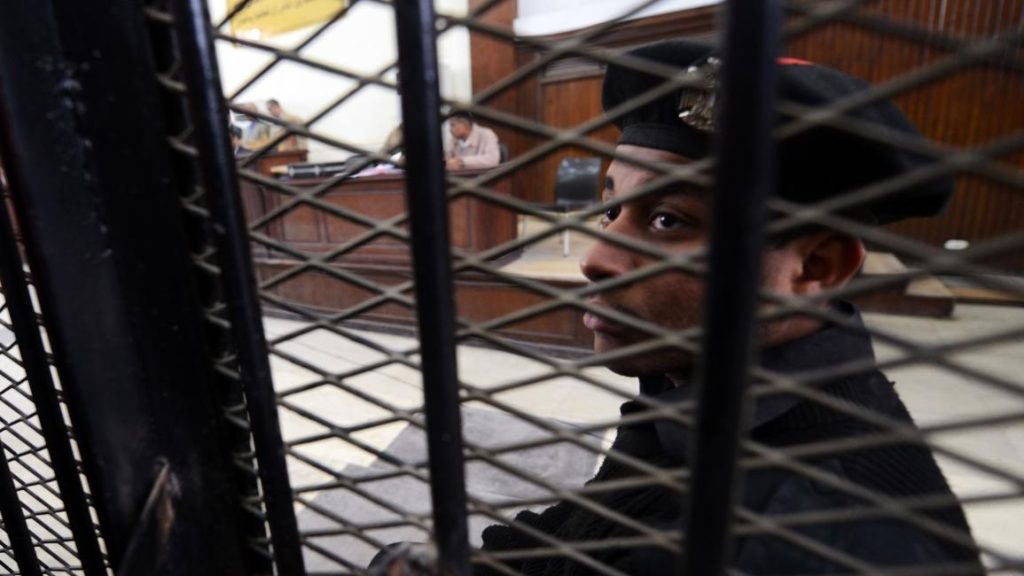Watan-Egyptian activists continue to pay the price for speaking out about the abuses they witnessed in prison, after spending many years behind bars.
Political activist Ahmed Douma recently found himself charged once again with “spreading false news, disturbing public peace, and harming the country’s interests” following testimonies he posted on Facebook recounting his ten years of imprisonment.
Bail and Investigations
Douma was interrogated on Saturday by the Supreme State Security Prosecution, which released him on bail of 10,000 Egyptian pounds.
According to Douma, the investigations focused on a Facebook post he published on April 13, where he accused a police informant at Wing 1 of Tora Investigation Prison of causing the death of a convicted criminal inmate. The inmate was allegedly forced to ingest a substance intended to induce bowel movements, a routine inspection method used on prisoners—both criminal and political—to prevent smuggling contraband into prison.
Rights organizations stated that summoning Douma for interrogation is part of a broader pattern of security measures used against him since his release in August 2023, following a presidential pardon for a sentence widely criticized for lacking fair trial guarantees.
In November 2023, Douma was also investigated in case No. 5892 of 2024 for social media posts and released on 20,000-pound bail, accused of “broadcasting false news domestically and internationally that disturbs public security and spreads fear,” under Article 102 bis of the Penal Code.
Rights groups affirmed that Douma’s case is not exceptional, but reflects a consistent pattern by the Supreme State Security Prosecution to re-target political opponents, either by re-investigating or re-imprisoning them after release. Similar cases include that of opposition figure Hussein Abdel Hadi, who was re-imprisoned after a presidential pardon.

Security Overreach
Organizations asserted that the practices of the Supreme State Security Prosecution demonstrate a clear security overreach undermining judicial independence and the guarantees of fair trials in Egypt. They called for an end to politically motivated summonses and the protection of fundamental freedoms, including freedom of expression and peaceful political participation.
They emphasized that rights to liberty, personal security, free expression, and political engagement are not state-granted privileges but fundamental rights enshrined in the Egyptian Constitution and international treaties ratified by Egypt.
The organizations demanded the closure of the investigations against Douma and called for measures to prevent the Supreme State Security Prosecution from being used as a tool to suppress dissent.
Prosecution of Ahmed Abu El-Fotouh
Meanwhile, the Emergency State Security Court held the first retrial session for Ahmed Abu El-Fotouh, son of former presidential candidate Abdel Moneim Abu El-Fotouh, seeking to drop charges against him.
Nine rights organizations condemned the continued prosecution of Ahmed Abu El-Fotouh, stating it was part of a new wave of retaliation against political opponents and their families. They criticized the use of Emergency State Security Courts, known for issuing harsh verdicts against opposition figures without respecting fair trial standards.
The statement highlighted similar harsh sentences previously issued by these exceptional courts, including a five-year sentence against political activist Alaa Abdel-Fattah, who remains on hunger strike, and prison terms against blogger Mohamed Radwan and rights lawyer Huda Abdel Moneim.
Rights groups demanded the immediate dropping of all charges against Ahmed Abu El-Fotouh and an end to the punitive policies aimed at tightening the security grip over public life.
Continued Harassment and New Charges
Ahmed Abu El-Fotouh was arrested on April 16 while renewing his driver’s license, based on a 15-year prison sentence handed down in absentia by an Emergency State Security Court in May 2022.
According to court documents, he was accused of “joining a terrorist organization with knowledge of its objectives” in the same case that sentenced his father and others, including political activist Mohamed El-Kassas and student leader Moaz El-Sharqawy.
Rights groups had previously condemned these verdicts as unjust and issued by exceptional courts that do not meet the minimum standards of due process.
Since the arrest of Abdel Moneim Abu El-Fotouh in February 2018, his son Ahmed had been a leading voice documenting and publicizing the abuses his father suffered in solitary confinement, including severe psychological and physical deterioration and repeated heart attacks.
Authorities have continued to escalate harassment against him: despite being in solitary confinement, Abu El-Fotouh Sr. was charged in an additional case (No. 786 of 2020) in December, with allegations of leading and funding a terrorist organization, according to rights organizations.
